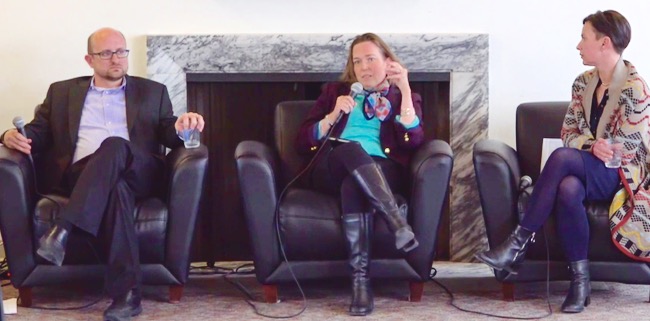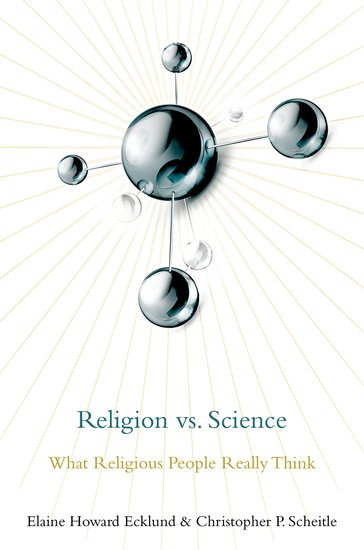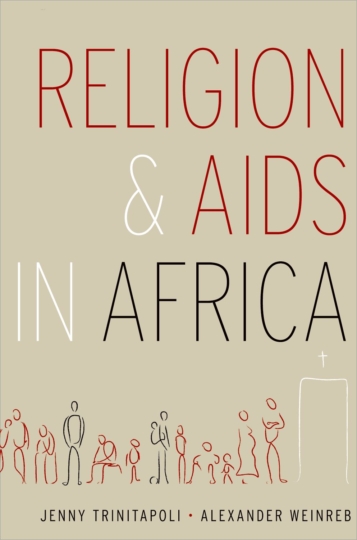Breaking good: Scholars discuss how religion and science can work together

What happens when well-known speakers are brought together to fill an auditorium to discuss the compatibility of religion and science?
Too often a circus in which performers with extremist views entertain an audience by affirming their prejudices, and widening a perilous gulf.
What happens when you bring together respected social scientists who for many years have gathered significant data on the relationship between science and religion?
A humble dialogue offering new pathways to cooperative efforts on issues from evolution and climate change to eradicating disease.
There was no shouting, cheering or booing drowning out speakers when three top researchers at the intersection of religion and shared their groundbreaking research at a recent seminar at Pennsylvania State University.
The seminar on science and religion featured sociologists Elaine Howard Ecklund of Rice University, Christopher P. Scheitle of West Virginia University and Jenny Trinitapoli of the University of Chicago. It was the second of five GlobalPlus dialogues on critical issues in international religion to be held at leading universities throughout the world.
The discussions are part of a collaborative effort of the Association of Religion Data Archives and the International Association of Religion Journalists.
What the three scholars presented was not a story of good vs. evil, but hard evidence dispelling myths of irrevocable conflict and revealing the potential for scientific and religious communities to work together for the common good.
Shedding Biases
First, all three researchers noted, you have to ignore some of the loudest, most extreme voices on the topic to learn the reality on the ground.
That means shedding a few biases, including:
Religious individuals, and evangelicals in particular, are anti-science: In research involving a national survey of more than 10,000 adults, Ecklund and Scheitle found that a strong majority of every religious group see science and religion as either being independent of one another or in collaboration with one another.
For their part, evangelicals were significantly more likely than the general population or any other religious group to say science and religion can help one another. Forty-seven percent of evangelicals, compared to 38 percent of U.S. adults and just 13 percent of individuals not affiliated with a religious group, said science and religion can support one another.
The group containing atheists, agnostics and the unaffiliated were by a wide margin the only group to say religion and science are in conflict, with a majority holding that view.

So while a minority of the population faces off in a war between science and religion, the majority of religious individuals are standing off to the side asking,
Ecklund and Scheitle note in their new book, Religion vs. Science: What Religious People Really Think.What are you all fighting about?
Scientists are anti-religion: In a study of the nation’s most elite universities, just 2 percent of scientists identified as evangelicals. And several studies have found that many evangelicals feel discriminated against both in their pursuit of advanced degrees in science and that their faith is often looked down upon within their fields.
Outside the most elite universities, however, 17 percent of scientists identify as evangelical Christians and 24 percent say they are mainline Protestants, Ecklund noted.
To be a religious person does not necessarily mean you are not a scientist, and to be a scientist does not necessarily mean you are not religious,
Ecklund said.
Evolution is a major fault line: It depends on how you ask the question.
If you just ask a broad question such as whether evolution is solely a natural process occurring over billions of years, many religious individuals would disagree.
But if you leave room for nuance to better reflect the complexity of individual perspectives, the answer is different.
What Ecklund and Scheitle discovered was that the vast majority of believers were fine with evolution, but they wanted to leave room for God having a role in guiding the process.
Religious Americans, particularly evangelical Christians, care deeply about maintaining an active role for God in the world,
Ecklund said. And at least for the Christians, and also Jews and some Muslims we talked with, protecting the idea that humans are created in the image of God and thus hold a special place in creation.
Faith, science should remain in separate realms: The reality is religion and science need one another.
Several studies suggest the best outcomes in many cases occur when science and religion cooperate, with for example religious communities educating their communities about subjects such as climate change and scientists recognizing beliefs play a major role in areas such as public health.
For the last decade, Trinitaopli has been the principal investigator of Tsogolo la Thanzi, an ongoing longitudinal study of young adults navigating the HIV epidemic in Malawi. Her work encompassed 200 religious communities.
Trinitapoli found the best outcomes occurred when science and religion worked together.
When people in religious communities received both a moral message and a scientific message about HIV, they were more likely to abstain from sex, be faithful to their partner, use condoms if they were unable to abstain or be faithful and have the courage to care for sick friends and congregation members.

When the clarifying information can be conveyed by a trusted source, that settles in really quickly,
said Trinitapoli, co-author with Alexander Weinreb of the book Religion & Aids in Africa.
So how can the gulf be overcome?
It takes work, Ecklund said.
This is not intuitive, given that we hear very loud voices saying there’s not much common ground,
she stated.
But it is possible, research indicates.
For one, science and religion have significant shared interests in promoting the value of new discoveries in medicine and other fields that have the potential to relieve suffering, research finds.
Encouraging Bridge Builders
For their part, the scholars said, religious communities can think about how science is portrayed in their communities, from youth education to the idea of promoting careers in science as a calling.
Some of the best bridge builders
that help dispel stereotypes, Scheitle and Ecklund state, can be trusted members of faith communities who also work in science, whether they are physicists, medical researchers or high school chemistry teachers.
For scientific communities, it is helpful to understand the importance religion plays as a trusted resource in the lives of individuals and communities, and the ways science can be advanced in collaborative efforts.
Some scientists also may want to consider how they frame the discussion of topics such as evolution, the scholars noted.
For example, they have significant allies in the religious community in promoting a scientific view of human origins. But if they turn the issue into an argument against the existence of God, they risk losing public consensus, and inviting an anti-science backlash.
You might have a very good cause, but if you don’t talk about it in the right way … it won’t be successful,
Scheitle noted.
Where science and religion also have common cause is in the push for diversity.
This includes not just white evangelicals, but blacks and Hispanics, two other groups that are more religious than the general population, but vastly underrepresented in the sciences.
What if the new faith and science issue was increasing access to science education, of increasing diversity in science through faith communities?
Ecklund asked. What if faith communities were seen as a potential avenue toward social equality in science rather than as a problem for science?
Envisioning such cooperation provides hope for a brighter future.
But as we see in the larger culture, it often seems it is more comforting to hold on to biases that allow us to brand our own points of view as morally superior.
When it comes to addressing the circus of division over the compatibility of religion and science, often fueled by media and polling companies that seem to relish conflict over nuance, there may be one helpful place to start:
Send out the clowns. Send in the research.
DAVID BRIGGS is a founder of the International Association of Religion Journalists. He also is the regular correspondent and online editor for the Association of Religion Data Archives (ARDA).
Enjoy a Video of the Conversation
If a video screen does not appear in your browser, you also can watch the visit by going directly to YouTube.
Care to read more?
- For more on this topic: GlobalPlus: Religion and Science
- For an index of David Briggs’ Ahead of the Trend columns, visit the ARDA website.
